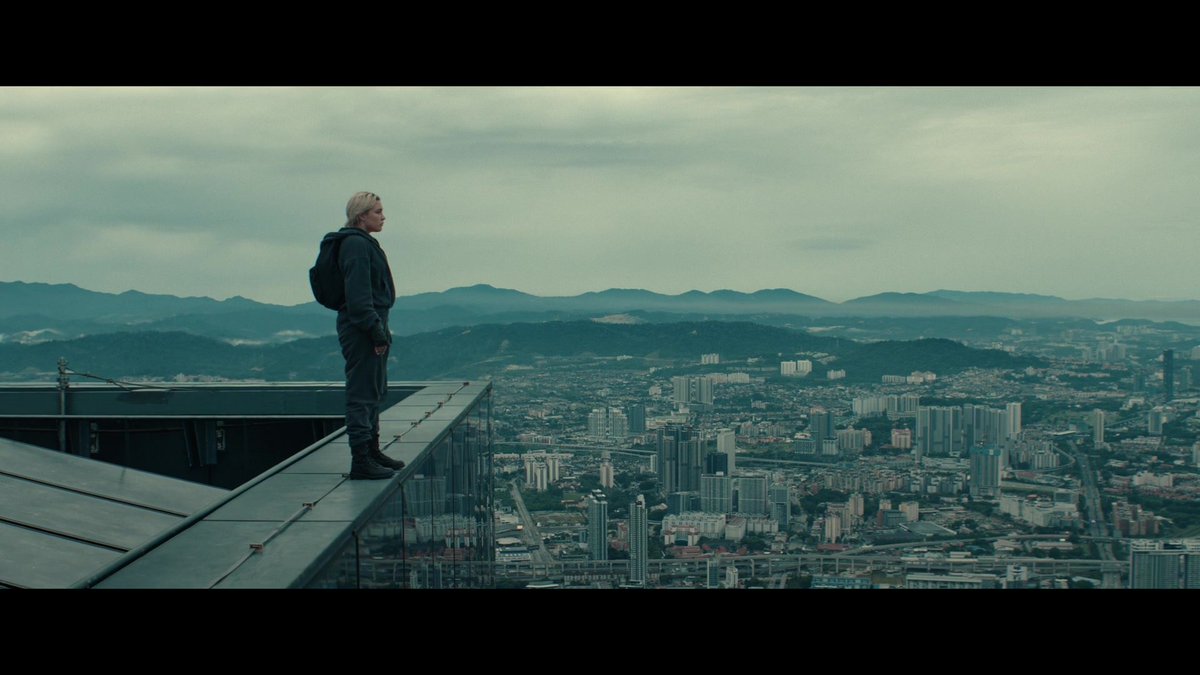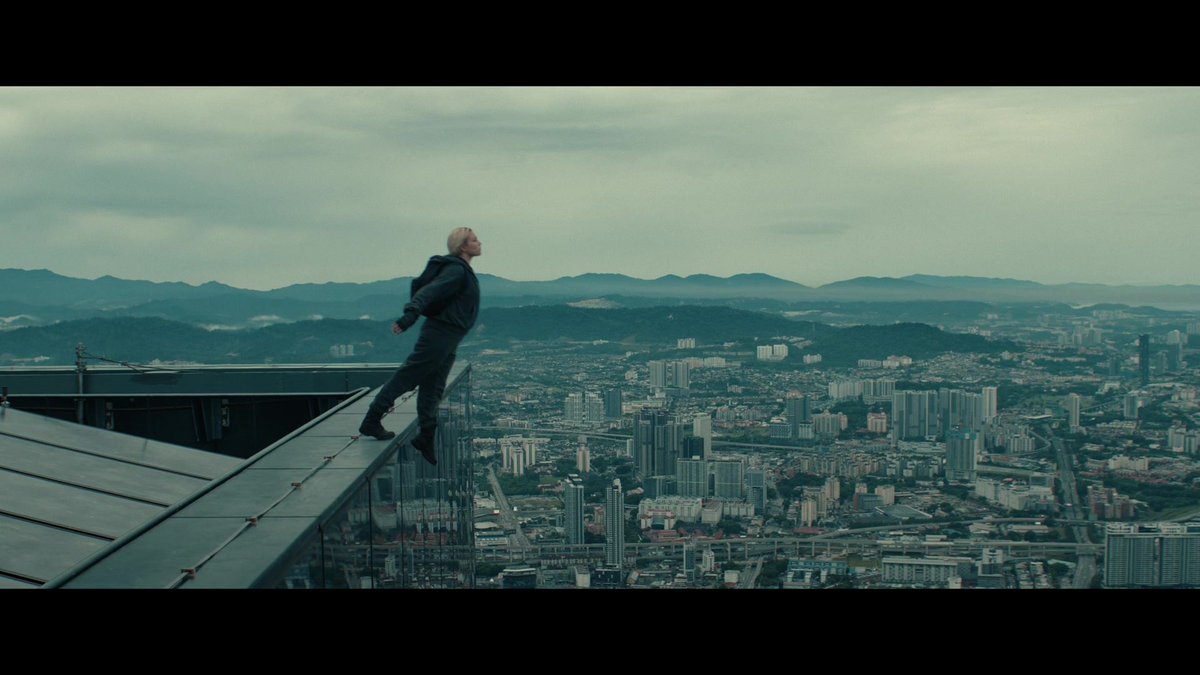#NowWatching “Star Trek II: The Wrath of Khan.”
“The Wrath of Khan” is one of those great movies that has somewhat been flattened in the memory of it. It’s brilliant, and epic, and propulsive.
But it is also elegiac and mournful, the story of old men who lead the young to slaughter while chasing phantoms of glories long past.

But it is also elegiac and mournful, the story of old men who lead the young to slaughter while chasing phantoms of glories long past.


It’s no small irony that “The Wrath of Khan” became a past glory that the “Star Trek” franchise would spend decades pursuing.
Like Kirk chases the memory of command, and like Khan chases his vendetta against Kirk.
“The Wrath of Khan” understands the futility of this.
Like Kirk chases the memory of command, and like Khan chases his vendetta against Kirk.
“The Wrath of Khan” understands the futility of this.
“It literally is Genesis.”
After the very Roddenberry-driven “Motion Picture”, it’s notable that “The Wrath of Khan” defaults back to the paranoia and skepticism of Starfleet more associated with Gene L. Coon’s “Star Trek.”
This is an atomic bomb story, after all.
After the very Roddenberry-driven “Motion Picture”, it’s notable that “The Wrath of Khan” defaults back to the paranoia and skepticism of Starfleet more associated with Gene L. Coon’s “Star Trek.”
This is an atomic bomb story, after all.
The Federation has always been an extrapolation of the “American Century” United States into the future.
It’s the myth of Kennedy’s New Frontier, extrapolated to its logical extreme. It’s American self-image as science-fiction.
It’s the myth of Kennedy’s New Frontier, extrapolated to its logical extreme. It’s American self-image as science-fiction.
Notably, the very first season of “Star Trek” makes it clear that the franchise’s future traces its origin back to the start of the post-Second World War order.
“The City on the Edge of Forever” makes it clear that “Star Trek” originated in America’s involvement in World War II.
“The City on the Edge of Forever” makes it clear that “Star Trek” originated in America’s involvement in World War II.
Indeed, it feels oddly appropriate that the final season of “Enterprise” opens by revisiting this idea, underscoring how rooted the “Star Trek” universe is in the American understanding of the world order following the end of the Second World War.
Of course, this is literally true in the sense that many of the early writers of “Star Trek” were veterans of the Second World War.
Without the Second World War, there would be no “Star Trek.” However, there is more to it than that. It’s about the world after that conflict.
Without the Second World War, there would be no “Star Trek.” However, there is more to it than that. It’s about the world after that conflict.
So it’s very clever that “The Wrath of Khan” is built around confronting the uncomfortable and often unspoken side of that world order, the fact that it’s built on the atrocity nuclear weapons.
A world born in nuclear fire. That’s what Genesis is. Destruction and birth.
A world born in nuclear fire. That’s what Genesis is. Destruction and birth.
Incidentally, one of the more underrated aspects of “The Search for Spock” is that Kruge is entirely right.
The Genesis Device is a tool of Federation imperialism and expansionism, the ability to remake entire worlds in their own image.
It’s horrifying and unsettling.
The Genesis Device is a tool of Federation imperialism and expansionism, the ability to remake entire worlds in their own image.
It’s horrifying and unsettling.
“Sir, you did it.”
“I did nothing… except get caught with my britches down.”
It’s interesting to imagine how fans would react today to a movie treating Kirk how “The Wrath of Khan” treated Kirk in 1982.
(To be fair, they’d probably do what they did in 1982: death threats.)
“I did nothing… except get caught with my britches down.”
It’s interesting to imagine how fans would react today to a movie treating Kirk how “The Wrath of Khan” treated Kirk in 1982.
(To be fair, they’d probably do what they did in 1982: death threats.)

More seriously, “The Wrath of Khan” largely treats Kirk the same way that “The Last Jedi” treats Luke.
He’s a fundamentally decent person with some very serious blindspots, who made some poor but in-character decisions that end up rippling out to hurt those closest to him.
He’s a fundamentally decent person with some very serious blindspots, who made some poor but in-character decisions that end up rippling out to hurt those closest to him.
Kirk assumes that he’s the hero of a romantic space opera, that the rules don’t apply to him, and that he can outrun any consequences.
“The Wrath of Khan” brings all of those consequences home to Kirk, and underscores that he can’t outwit or cheat what’s coming to him.
“The Wrath of Khan” brings all of those consequences home to Kirk, and underscores that he can’t outwit or cheat what’s coming to him.
By the way, this is beautiful. I am a long-time defender of Shatner’s… divisive performance style.
But, like Luke before “The Lost Jedi”, he seemed like more of an archetype than a three-dimensional character.
“The Wrath of Khan” makes Kirk feel like a fully formed individual.
But, like Luke before “The Lost Jedi”, he seemed like more of an archetype than a three-dimensional character.
“The Wrath of Khan” makes Kirk feel like a fully formed individual.
We don’t love these characters because they are broadly-drawn archetypes that represent abstract ideals.
We love these characters because they are complex, multi-faceted, nuanced. They feel human, rich, deep, real.
Kirk becomes a tragic, flawed figure in “The Wrath of Khan.”
We love these characters because they are complex, multi-faceted, nuanced. They feel human, rich, deep, real.
Kirk becomes a tragic, flawed figure in “The Wrath of Khan.”
(Incidentally, that’s what makes Picard so compelling as well; the fact that, underneath his sophisticated and thoughtful exterior, he isn’t perfect either.
Where Kirk is impulsive and cavalier, Picard is stubborn and prideful. He’s human. He’s fully formed. He’s complex.)
Where Kirk is impulsive and cavalier, Picard is stubborn and prideful. He’s human. He’s fully formed. He’s complex.)
“I don’t believe in the no-win scenario.”
One of the myriad great things about “The Wrath of Khan” is that Kirk spends much of the film actively resisting what the film is trying to tell him.
Even after being confronted with his failures with Khan and David, he isn’t humbled.
One of the myriad great things about “The Wrath of Khan” is that Kirk spends much of the film actively resisting what the film is trying to tell him.
Even after being confronted with his failures with Khan and David, he isn’t humbled.
It’s a great example of plot and character being tied together, where the universe is trying to tell Kirk something - that some consequence you can’t cheat your way out of - but Kirk refuses to learn, so the price keeps escalating.
It’s a nice way of escalating stakes.
It’s a nice way of escalating stakes.
There’s a grand tragedy in the way that *everybody but Kirk* ends up paying for Kirk’s recklessness.
Kirk’s heroic sacrifice would be an easy redemption, and would give him a happy ending.
Having to live with his best friend’s death a son that hates him is a fitting punishment.
Kirk’s heroic sacrifice would be an easy redemption, and would give him a happy ending.
Having to live with his best friend’s death a son that hates him is a fitting punishment.
As Bill points out, a brilliant aspect of the original “Star Trek” movies is that they are the rare films that are at least subtextually about what it means to adapt a property from television to film.
Different rules apply, so there are tensions that the movies mine for drama.
Different rules apply, so there are tensions that the movies mine for drama.
https://twitter.com/mudron/status/1550251840083984385
“The Voyage Home” isn’t about time travellers from the future arriving in 1986 San Francisco.
It’s about relics of sixties television and counterculture being abruptly dropped into Reagan’s America.
The movie’s power is in watching sixties television stars in an eighties film.
It’s about relics of sixties television and counterculture being abruptly dropped into Reagan’s America.
The movie’s power is in watching sixties television stars in an eighties film.
There is a sense watching the original “Star Trek” films that the television cast is “boldly going” somewhere that they haven’t gone before: into film.
The rules are different, the norms are different, the expectations are different. There is dramatic tension in that.
The rules are different, the norms are different, the expectations are different. There is dramatic tension in that.
• • •
Missing some Tweet in this thread? You can try to
force a refresh









